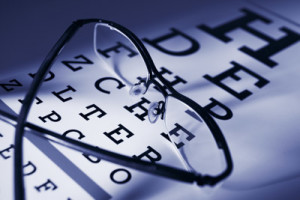 Vision screening tests are not the same as eye exams. Eye exams are very important so that any potential or specific problems can be identified and treatment options ascertained. Vision screenings, such as you might get at the DMV, are very quick, limited tests that try to detect people who are at risk for vision problems, but nothing can replace the thoroughness of a full eye exam. Although vision screenings can indicate whether someone needs to get their eyes checked, only comprehensive eye exams by an optometrist or ophthalmologist (eye doctors) includes careful testing of all aspects of your vision.
Vision screening tests are not the same as eye exams. Eye exams are very important so that any potential or specific problems can be identified and treatment options ascertained. Vision screenings, such as you might get at the DMV, are very quick, limited tests that try to detect people who are at risk for vision problems, but nothing can replace the thoroughness of a full eye exam. Although vision screenings can indicate whether someone needs to get their eyes checked, only comprehensive eye exams by an optometrist or ophthalmologist (eye doctors) includes careful testing of all aspects of your vision.
There are many things that an eye doctor will check for in an eye exam:
Refractive Errors
Refractive errors are the most familiar eye problems, as these are the cause of near- and far-sightedness or astigmatism. Usually these are simply treated with glasses or contacts, but sometimes people opt for refractive surgery.
Amblyopia
Amblyopia occurs when one eye has some problem that makes vision in that eye much worse than the other eye. Because of this disparity, the brain will start ignoring the signals coming from that eye, effectively rendering the eye blind. This can be treated by correcting the vision in that eye and stimulating the brain to accept inputs, but if left untreated, there may be permanent dysfunction.
Strabismus
Strabismus is generally some kind of crossed eyes. If the eyes are not working together, the eye doctor can detect that and help treat it. If the eyes do get out of sync, problems with depth perception can occur, and in some cases it can lead to Amblyopia.
Eye Teaming Problems
Sometimes the eyes will be well-aligned but still not quite working together. These problems can cause eye strain and headaches and other vision problems when attempting to read or focus on close objects.
Focusing Problems
There are many things that can cause problems focusing, including some undeveloped aspects of the visual system in children, or even the natural decline resulting from age. An eye exam will be able to identify and potentially correct these kinds of problems.
Eye Diseases
Like many other diseases, eye diseases will often have no real symptoms in the early stages. However, an eye doctor can check for signs of such diseases as glaucoma and other eye diseases and help treat them before they become a serious problem.
Overall, an eye exam will help patients discover any vision problems they might have but might not have noticed yet so that those problems can be treated and the risk of permanent vision loss can be reduced. In many ways, our eyesight can be the most important sense we have, and making sure it remains healthy and useful throughout our lives is very important. Even if your vision is good, it’s still a good idea to schedule an eye exam. Be sure to use IPALC’s physician directory at www.ipalc.org/find to search for an ophthalmologist that can help you, or email IPALC directly at info@ipalc.org for assistance from our helpful staff.
Share on Facebook



 Southwest Florida Medicine.com is dedicated to bringing you the very best health information available today!
Subscribe or check back regularly!
Southwest Florida Medicine.com is dedicated to bringing you the very best health information available today!
Subscribe or check back regularly!